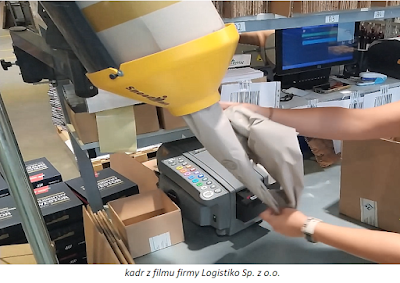A frame from the film by Logistiko Sp. z o.o.
Good practices and investments related to Cleaner Production
Example No. 22
Minimizing the amount of packaging materials used and replacing plastic materials with paper ones
Company:
Logistiko sp. z o.o. with its headquarter in Kraków,
place of implementation of good practice: warehouse in Kutno
Industry branch: logistics
Resources in question:
- Materials (packaging)
- Waste
When packing products for shipment, the company used a lot of plastic packaging materials, including, for example, materials used as fillers and adhesive tapes.
Applied solution:
Paper and plastic waste has been reduced by replacing materials previously used for packaging and sealing shipments with paper fillers and paper tapes.
For shipments for which there is no perfectly matching box, the tops are cut with a wallpaper knife to minimize the need for fillers – photo no. 1.
The fillers are collected by hand, in the necessary amount, from the drum shown in photo no. 2, and then put into the box by hand – photo no. 3.
Paper tape with water-activated glue (as a replacement for classic adhesive tape) is cut to a given length by the device presented in photo no. 4, and then the finished pieces of tape are manually glued onto the boxes by an employee – photo no. 5.
For shipments for which there is no perfectly matching box, the tops are cut with a wallpaper knife to minimize the need for fillers – photo no. 1.
The fillers are collected by hand, in the necessary amount, from the drum shown in photo no. 2, and then put into the box by hand – photo no. 3.
Paper tape with water-activated glue (as a replacement for classic adhesive tape) is cut to a given length by the device presented in photo no. 4, and then the finished pieces of tape are manually glued onto the boxes by an employee – photo no. 5.
Obtained benefits and effects of the implementation:
- Reducing both paper and primarily plastic waste by reducing the use of fillers and tapes made of plastic (which also required the time spent on additional segregation before sending the waste for recycling) – a cost of about PLN 1,000/month
Photo no. 1. Trimming an oversized box, to reduce the amount of the filler used
A frame from the film by Logistiko Sp. z o.o.
Photo no. 2. Collecting the required amount of paper filler from the drum
A frame from the film by Logistiko Sp. z o.o.
Sources:
- Report on the Cleaner Production Project No. 47.758, developed within the framework of the Cleaner Production Academy at Logistiko Sp. z o.o.: “Reduction of electricity consumption, reduction of atmospheric emissions and minimization of waste generation
- Materials (including photos) submitted by Logistiko Sp. z o.o.
Polish version:
This
material has been subsidized by the National Fund for Environmental
Protection and Water Management. The Polish Cleaner Production Movement
Association is solely responsible for its content.











0 komentarze :
Prześlij komentarz